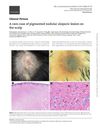49 citations,
February 2009 in “Clinical Rheumatology” SLE is more common among Nigerians than previously thought, especially in women, requiring early treatment.
 5 citations,
February 2019 in “Oral and Maxillofacial Surgery”
5 citations,
February 2019 in “Oral and Maxillofacial Surgery” Hair loss can be reversed or even cured using advanced hair restoration techniques, with rare complications like swelling and bleeding.
 2 citations,
March 2015 in “World journal of acupuncture-moxibustion”
2 citations,
March 2015 in “World journal of acupuncture-moxibustion” Traditional Chinese medicine techniques like catgut embedment, moxibustion, and bloodletting showed better results for treating hair loss than the drug finasteride.
 6 citations,
October 2016 in “Food Science and Biotechnology”
6 citations,
October 2016 in “Food Science and Biotechnology” The water extract of Bituminaria bituminosa, high in phenolic compounds, shows strong antioxidant and enzyme inhibitory potential.
 1 citations,
August 2012 in “Food Science and Biotechnology”
1 citations,
August 2012 in “Food Science and Biotechnology” The essence made from fermented products increased hair growth in mice better than minoxidil.
11 citations,
July 2014 in “Clinical Rheumatology” Cyclophosphamide often causes gastrointestinal issues, hair loss, and low blood cell counts in Chinese patients with autoimmune diseases.
13 citations,
February 2017 in “Clinical rheumatology” Tofacitinib may help treat nail dystrophy, especially when other treatments fail.
 37 citations,
August 2016 in “Clinical, Cosmetic and Investigational Dermatology”
37 citations,
August 2016 in “Clinical, Cosmetic and Investigational Dermatology” The document concludes that better treatments for CCCA are needed and more research is required to understand its causes related to hairstyling and genetics.
 3 citations,
April 2016 in “Food Science and Biotechnology”
3 citations,
April 2016 in “Food Science and Biotechnology” Oriental melon leaf extract may help hair grow and keep it in the growing phase longer.
 March 2024 in “Chinese Chemical Letters”
March 2024 in “Chinese Chemical Letters” Tiny glowing gold particles can stop hair growth by blocking a specific cell signal.
13 citations,
April 2013 in “Chinese Chemical Letters/Chinese chemical letters” The method effectively identifies and measures seven banned substances in cosmetics.
December 2024 in “Chinese Chemical Letters” A new topical finasteride gel using nanoparticles shows promise for safe and effective hair regrowth.
 November 2021 in “bioRxiv (Cold Spring Harbor Laboratory)”
November 2021 in “bioRxiv (Cold Spring Harbor Laboratory)” 4-aminopyridine helps skin wounds heal faster and better.
Antiandrogen treatment helps reduce hair follicles and sebaceous glands in hirsute women.
 9 citations,
August 2015 in “Tissue Engineering and Regenerative Medicine”
9 citations,
August 2015 in “Tissue Engineering and Regenerative Medicine” Human skin cell byproducts can potentially be used to treat hair loss and promote hair growth.
4 citations,
August 1971 in “Pediatric clinics of North America/The Pediatric clinics of North America” Childhood hair and scalp disorders can be managed with treatments like cortisone and corticosteroids.
 13 citations,
June 2020 in “Scientific reports”
13 citations,
June 2020 in “Scientific reports” Melatonin stimulates the skin components of ram's scrotum during their non-breeding season.
 November 2015 in “European journal of dermatology/EJD. European journal of dermatology”
November 2015 in “European journal of dermatology/EJD. European journal of dermatology” A 55-year-old woman with several health conditions did not see hair regrowth after a transplant.
 December 2015 in “Vascular Pharmacology”
December 2015 in “Vascular Pharmacology” Prasugrel is better than clopidogrel at preventing heart damage and improving blood flow in small heart vessels during heart artery procedures.

A man had a rare pigmented nodule on his scalp that developed from birthmarks.
April 2023 in “Journal of Investigative Dermatology” Chronic graft-versus-host disease in the skin shows strong Th1 immune response and unique barrier issues.
44 citations,
January 2015 in “Development” Human Schwann cells can be quickly made from hair follicle stem cells for nerve repair.
 8 citations,
March 2014 in “American Journal of Pathology”
8 citations,
March 2014 in “American Journal of Pathology” Damaged hair follicles make mice more prone to skin inflammation and skin cancer after UV exposure.
13 citations,
January 2020 in “Acta Dermato Venereologica” Ruxolitinib treatment led to unexpected hair regrowth in a patient with alopecia universalis.
 April 2018 in “Journal of Investigative Dermatology”
April 2018 in “Journal of Investigative Dermatology”  April 2018 in “Journal of Investigative Dermatology”
April 2018 in “Journal of Investigative Dermatology” Kaempferol helps skin stem cells grow and may improve skin thickness due to its 3-OH group.
 April 2018 in “Journal of Investigative Dermatology”
April 2018 in “Journal of Investigative Dermatology” Mint water extract boosts protective enzymes in skin cells.
 April 2018 in “Journal of Investigative Dermatology”
April 2018 in “Journal of Investigative Dermatology” Claudin-1 and Claudin-3 are crucial for keeping hair follicle structure and preventing a type of hair loss called telogen effluvium.
 May 2023 in “The journal of investigative dermatology/Journal of investigative dermatology”
May 2023 in “The journal of investigative dermatology/Journal of investigative dermatology” A potential treatment for atopic dermatitis could be to increase PADI1 expression to improve skin barrier function.
 March 2022 in “Indian Journal of Animal Research”
March 2022 in “Indian Journal of Animal Research” Dog hair follicle stem cells can turn into fat cells.



















